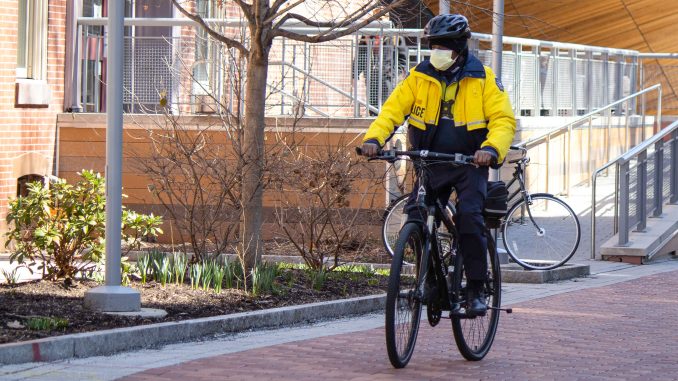
Temple University’s Campus Safety Services is on track to increase its forces by 50 percent by the end of 2022.
Campus Safety Services hopes to fill 40 vacancies in the force, said Charles Leone, executive director of Campus Safety Services.
Campus Safety Services will conduct necessary background checks on all hirings while abiding by TUPD’s self-evalution on equipment training, community engagement and mental health from former President Barack Obama’s Task Force on 21st-Century Policing, Leone said. Patrol zones will not expand after more officers are hired.
Temple President Jason Wingard announced this goal alongside plans to expand campus safety infrastructure and develop an anti-violence institute in response to the fatal shooting of Samuel Collington, a senior political science major in November 2021.
Several individuals are currently undergoing Campus Safety Services’ background check process, while 113 applicants are awaiting review for police academy training. Campus Safety Services hopes to place 12 potential officers into an upcoming police academy class.
The hiring process includes a background check, drug screening, a completed medical evaluation, a reading and writing comprehension test, a physical agility test, interviews, orientation and onboarding, Leone said. Once hired, the applicant will participate in field training.
TUPD will comply with their self-evaluation based on the Task Force on 21st-Century Policing, which was created to increase trust of law enforcement officers. New hires will attend a training program led by Lori Pompa, executive director of Temple’s Inside-Out Center, and Norman Conti, a professor of Sociology at Duquesne University, who developed the police training based on the Inside-Out model. Inside-Out Prison Exchange Program provides opportunities to incarcerated individuals.
Campus Safety Services will seek the community’s support and feedback on how the department can create a safer community, Leone said.
“We want to be held accountable,” Leone said. “We want people to look at us.”
Police are often called to respond to issues that they do not have the de-escalation and trauma-informed skills for, like domestic violence, said A’Brianna Morgan, a mass liberation organizer at Reclaim Philadelphia, a local activism group.
An increased police presence also raises certain issues for students and local residents, including racial profiling and the handling of mental health crises, Morgan said
“If you’re a Black student on campus you’re dealing with the constant tension of like, ‘Oh, am I going to be seen as a student of this university or I’m going to be seen as a Black resident who needs to be like, watched vigilantly and maybe harassed, interrogated, about what you’re doing somewhere,’” Morgan said.
While participating in a community walkthrough along 16th Street with Temple President Jason Wingard in December 2021, Cory Staples, a junior health professions major and Temple Student Government’s director of Campus Safety, said some students who joined them on the tour expressed their concerns that an increased police presence would cultivate fears among students and the community.
“I know me myself, you know, being a Black man on campus in North Philadelphia, that would probably instill a little bit more fear in me as well,” Staples said.
Jennifer Hedberg, a reading specialist and mother of a senior industrial and engineering systems major, hired JNS Protection Services, a private security company, to patrol the areas around 18th and 19th streets and Norris, Paige and Montgomery streets — the area near her son’s apartment, in response to increased crime in the city.
Currently, Campus Safety patrols between Jefferson Street and Susquehanna Avenue and 9th and 18th streets, according to the patrol map. Between Broad and 13th streets, officers patrol down to Girard Avenue.
Hedberg believes that Campus Safety Services’ hiring is not happening quickly enough.
“If it’s taking too long, why can’t they take my idea?” Hedberg said. “I live in Massachusetts and from the minute I had this idea until there was someone patrolling the streets — 10 days.”
Leone suggests Temple should continue educating parents and students on the patrolled areas, especially when looking for off-campus housing.
The only way to mitigate the potential issues from an increased police presence is to stop the hiring and divert funds to student and community mental health services, Morgan said.
“You cannot police your way out of gun violence and that is basically what this plan is meant to do,” Morgan said.
Fallon Roth and Devon Russell contributed reporting.
Correction: A previous version of the story misreported Norman Conti’s title. It has been changed.



Be the first to comment